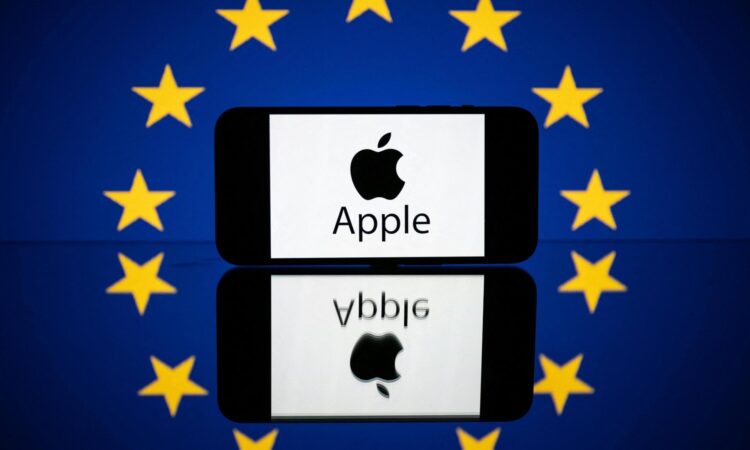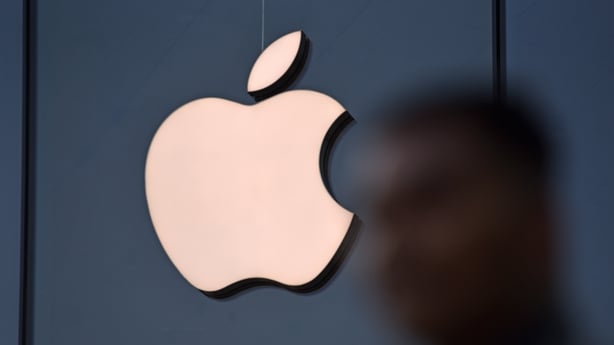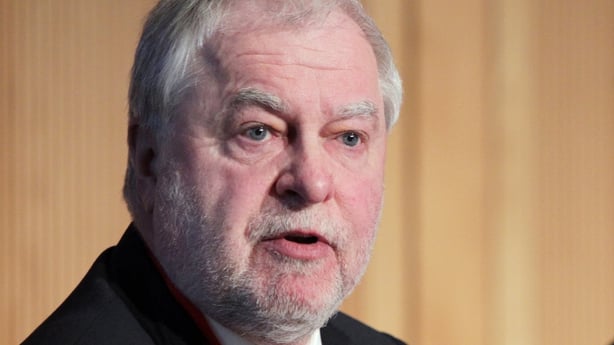
Tomorrow will see the latest development in the long running saga that is the Apple tax case.
The Advocate General of the Court of Justice of the European Union, which is Europe’s highest court, will give their opinion in relation to the European Commission’s appeal against an earlier ruling by the lower court.
That 2020 decision by the EU’s General Court overturned the Commission’s 2016 finding that Apple had underpaid €13.1 billion in tax due to Ireland between 2003 and 2014.
This has been running a while. Can you remind me of the background to this case?
The origins can be traced back to a 2013 appearance by Apple’s boss Tim Cook before a US Senate committee.
At the hearing, intense scrutiny was applied to Apple’s tax arrangements.
The company was accused by Senators of sheltering billions of dollars in profits in “ghost companies” in Ireland that did not pay tax elsewhere.

Ireland was even labelled a “tax haven” – a serious accusation which has been repeated by some critics of our tax regime since then.
The European Commission was watching and subsequently began an in-depth investigation into Apple’s tax affairs in Ireland a year later.
And the outcome of that was the eye-wateringly large tax ruling?
Yes, following a lengthy probe, in 2016 the Commission found that two tax rulings in 1991 and 2007 issued by Revenue to Apple had “substantially and artificially lowered the tax paid by Apple in Ireland since 1991”.
It was the Commission’s view that these determinations in effect rubber-stamped a method of determining the taxable profits for two companies based in Ireland – Apple Sales International and Apple Operations Europe – which were managed from outside Ireland and were responsible for all Apple’s sales outside of the Americas.
In its ruling, the Commission claimed the Revenue determinations did not correspond to economic reality, because almost all the profits recorded by the two companies were attributed internally by Apple to a “head office”.
But the Commission concluded the head office only actually existed on paper and as a result could not have generated such profits.
This was a problem because it is illegal under long-established EU state aid rules for any country to give preferential treatment to one company over another when they are both subject to the same tax rules in that state.
The effects of that went wider than Ireland though.
According to the Commission, Apple was booking all its sales across the EU in Ireland, rather than in the countries where its iPhones, iPads, etc were being sold.
In the process, it did not have to pay tax on almost all of the profits, it was alleged.
The result, the Commission declared, was that Apple owed €13.1 billion in unpaid taxes to Ireland for the period between 2003 and 2014 (when Apple changed its structures), as well as €1.2 billion in interest.
Did Apple appeal?
Yes Apple, and Ireland, were not happy with the findings and decided to appeal the ruling.
Apple strenuously denied at the time that it had any kind of a special deal and has maintained then and since in the strongest possible terms that it pays the tax it owes everywhere it operates.
“The European Commission has launched an effort to rewrite Apple’s history in Europe, ignore Ireland’s tax laws and upend the international tax system in the process,” wrote CEO Tim Cook in a public letter in August 2016.
And he warned that the impact could be a profoundly harmful effect on investment and job creation in Europe.

Concerned about the external perception of the country, the Government also took the decision to appeal the ruling.
Ireland had long been criticised by some outsiders over its 12.5% corporation tax rate, which has proven to be the bedrock for foreign direct investment (FDI) for decades.
The view, therefore, in Government circles was that anything that questioned the basis of the country’s tax policy may not be good for future investment.
It also had to be seen to back Apple, which pays more tax here each year than any other organisation or individual.
What was the outcome of that appeal?
The case was heard over two days in September of 2019 by the General Court of the EU.
The following July the court delivered its decision, annulling the commission’s findings.
The court found the Commission was wrong to declare that Apple Sales International and Apple Operations Europe had been granted a selective economic advantage and, by extension, State aid.
It said the commission failed to show “to the requisite legal standard” that Apple enjoyed preferential treatment which amounted to illegal state aid.
But the commission did not accept the decision and in September 2020 said it would lodge an appeal.
Commissioner Margrethe Vestager claimed the court had made a number of “errors of law”.
“The General Court judgment raises important legal issues that are of relevance to the commission in its application of state aid rules to tax planning cases,” she stated at the time.
“The commission also respectfully considers that in its judgment the General Court has made a number of errors of law.”
“Making sure that all companies, big and small, pay their fair share of tax remains a top priority for the commission. The General Court has repeatedly confirmed the principle that, while member states have competence in determining their taxation laws, they must do so in respect of EU law, including state aid rules,” she added.
When did that appeal take place?
The Court of Justice of the EU heard that appeal back in May of this year.
At the hearing, the Commission’s lawyer, Paul-John Loewenthal, argued that the lower court’s judgment was “legally flawed” and should be set aside.
“Its outcome will determine whether member states may continue to grant multinational substantial tax breaks in return for jobs and investments,” commission lawyer Paul-John Loewenthal told the court.
He claimed that Ireland had misapplied its tax laws when Revenue made the two tax rulings in 1991 and 2007 and as a result, Apple got substantial tax breaks compared to other taxpayers.
But Apple’s lawyers refuted the commission’s arguments and claimed the commission had made numerous errors and misrepresentations in its arguments.
They also argued that the company had paid its fair share of taxes in the appropriate country.

“The profits we are talking about – the profits the commission said should be attributed to these branches in Ireland – those profits were in fact subject to the US tax regime,” Daniel Beard told the Court.
“Apple built up reserves for the payment of those US taxes and is paying around €20 billion in tax in the US on those very same profits that the commission says should have been taxed by Ireland,” he said.
“Apple has paid the taxes that were due under the Irish tax code,” he added.
Former Attorney General Paul Gallagher who was representing Ireland, said the European Commission’s analysis “was infected” by the “wrong legal premise” and he accused the Commission of making “entirely misleading remarks”.
So after this, is that it for the case?
No, the Advocate General’s opinion is non-binding.
We’ll still have several more months before the court itself makes its own official findings in the case.
But that said, it is unusual for an Advocate General’s opinion not to be followed by the court.
So we should get a strong sense of which way the wind is blowing from the AG’s ruling.
What about the €13.1 billion? Where is that now?
Well including the interest, the original figure was actually more like €14.3 billion.
Following the original Commission ruling the money was paid over by Apple in 2018 into an escrow or temporary third-party holding account.
The objective of the investment policy is to preserve the capital value of the escrow fund to the greatest extent possible in light of the prevailing market conditions.
The agreed risk appetite for the escrow fund is “low”, with investments permitted only in securities that have a low degree of risk, such as highly rated fixed-income securities of short to medium-term duration.
According to the recent report of the Comptroller and Auditor General, at the end of December the total value of the assets reduced last year by €259m to €13.374 billion from €13.633 billion in 2021.
This was due to the significant increase in yields across global fixed-income markets, and fund operating expenses.
That followed a drop in value the previous year also, for similar reasons.
If the Commission wins its case, the money in the escrow goes to the exchequer here.
If the Commission loses, the money goes back to Apple.
In the meantime, the big winners from this situation are the escrow fund managers, who in 2022 were paid €6m.
And, of course, the lawyers.






